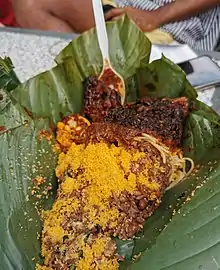Waakye
Waakye (/ˈwɑːtʃeɪ/ WAH-chay)[2] is a Ghanaian dish of cooked rice and beans, commonly eaten for breakfast or lunch. However, others eat it for supper. The rice and beans, usually black eyed peas or cow beans, are cooked together, along with red dried sorghum leaf sheaths or stalks and limestone.[4] The sorghum leafs and limestone give the dish its characteristic flavor and a red appearance and the sorghum is taken out before consumption. The word waakye is from the Hausa language and means beans. It is the contracted form of the full name shinkafa da wake which means rice and beans.[5]
 | |
| Type | Rice |
|---|---|
| Place of origin | |
| Created by | The people of northern Ghana |
| Serving temperature | mostly hot |
| Main ingredients | beans and rice |
Waakye is commonly sold by roadside vendors. It is believed that the Hausa and the Northern ethnic groups of Ghana are the best cooks of waakye. It is then commonly wrapped in banana leaf and accompanied by one or more of Wele stew, boiled chicken eggs, garri, shito, vegetable salad of cabbage, onions and tomatoes, spaghetti (which is called talia in Ghana) or fried plantain.[4][6]
History
The dish, which originated from the Hausa people, may be the origin of the rice and beans dishes commonly found in the Caribbean and South America, brought there through slave trade.[4]
Preparation
Waakye is usually prepared by first boiling the beans together with dried millet stalk leaves for the beans to get softer and reddish before adding rice to it on fire.[7]
References
- "Waakye: A popular dish from Ghana made with rice and beans". irri.org. Retrieved 30 August 2013.
- "Waakye - An Everyday Ghanaian meal". Breakfast Daily. January 23, 2020.
- Muyambo, Freda (16 August 2018). "All You Need to Know About Waakye". The Spruce Eats. dotdash.
- "Ghana: Waakye". 196 flavors. 2013-01-08. Retrieved 2020-06-01.
- Appiah-Adjei, Salomey (2019-05-31). "Waakye: The dish with loyal patrons". www.graphic.com.gh. Retrieved 2019-06-02.
- "Homemade waakye". biscuits and ladles. 2017-10-05. Retrieved 2020-09-12.
